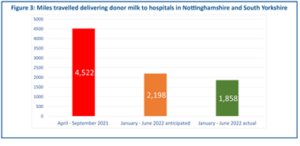Case study – Donor Milk Satellites
Organisation: Countess of Chester Hospital and Milk Bank at Chester
What was the issue?
The environmental impact of distributing donor milk from the Milk Bank at Chester. The Milk Bank supplies to hospitals as far afield as South Wales and Northeast England, through a network of depots. Volunteer blood bike services deliver the milk to the hospitals. Some bikes travel long distances to deliver milk, so research was conducted to find out whether additional depots would reduce the cost and environmental impact of distribution.
What action was taken?
The number of miles travelled by the Blood Bike services delivering milk from depots was analysed. King’s Mill Hospital in Mansfield was identified as a new potential site, previously supplied with donor milk from Hull 78 miles away. The anticipated reduction in mileage was calculated (including additional mileage required to restock monthly). The reduction in fuel and associated carbon emissions was calculated and the new site opened in December 2021.
What was the Delivering a Net Zero NHS benefit?
By making one delivery per month from Chester to Kings Mill (return trip 180 miles) this new depot has over a six month period:
-
-
- Reduced mileage from 4522 miles to 1858 miles
- Reduced fuel by 93.5 gallons
- Reduced CO₂e emissions by 918kg
-
What are the wider benefits?
- 56% increase in volume of milk supplied to King’s Mill
- 24% increase in number of donors
- Blood bike fuel costs reduced by £765
- Future plans to expand this to reduce mileage travelled collecting milk from donor families as well as how this model can be replicated in other areas.
Link for further information:
Please click here to view the poster and further details: Donor Milk Depot poster for BAPM updated November 2022
Key contact and email: Emma Savage (Operational Manager, the Milk Bank at Chester), emmasavage2@nhs.net
